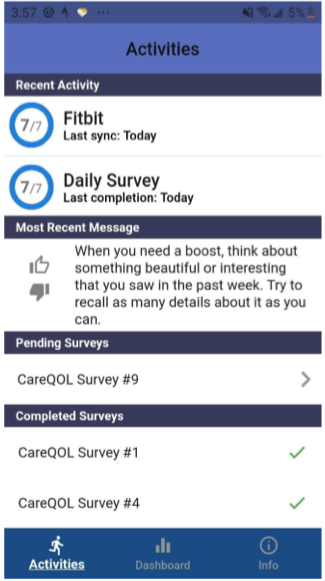Abstract
Background: Care partners (i.e., informal family caregivers) of individuals with health problems are faced with considerable physical and emotional stress, often with substantial negative impact on the health-related quality of life (HRQOL) of both the care partner and care-recipient. Given that these individuals are often overwhelmed by their caregiving interventions, low burden self-management interventions are needed to support caregivers to ensure better patient outcomes.
Objective: The primary objective of this study is to describe an intensive data collection protocol that involves the delivery of a personalized just-in-time adaptive intervention (JITAI) that incorporates passive mobile sensor data feedback (sleep and activity data from a Fitbit ®), and real-time self-reporting of HRQOL via study specific app called CareQOL to provide personalized feedback via app alert.
Methods: Participants from three diverse care partner groups will be enrolled (care partners of persons with spinal cord injury [SCI]; care partners of persons with Huntington disease [HD]; and care partners of persons with hematopoietic cell transplantation [HCT]). Participants are randomized either to a control group, where they will wear the Fitbit® and provide daily reports of HRQOL over a three-month (90 day) period (without the personalized feedback), or the JITAI group, where they will wear the Fitbit®, provide daily reports of HRQOL and receive personalized pushes for 3 months. At the end of the study, participants complete a feasibility and acceptability questionnaire, and metrics regarding adherence and attrition are calculated.
Results: This trial opened for recruitment in November 2020. Data collection was completed in June 2021, and the primary results are expected to be published in winter 2021. Conclusions: This trial will determine the feasibility and acceptability of an intensive app-based intervention in three distinct caregiver groups: care partners for persons with a chronic condition that was caused by a traumatic event (i.e. SCI); 2) care partners for persons with a progressive, fatal neurodegenerative disease (i.e., HD); and 3) care partners for persons with an episodic cancer condition that requires intense, prolonged inpatient and outpatient treatment (persons with HCT).
Trial Registration: ClinicalTrial.gov NCT045556591; https://clinicaltrials.gov/ct2/show/NCT045556591
Key words: caregivers; quality of life; Spinal Cord Injuries; Huntington Disease; Hematopoietic Stem Cell Transplantation; Feasibility Studies; self-management; mobile applications; outcome assessment
